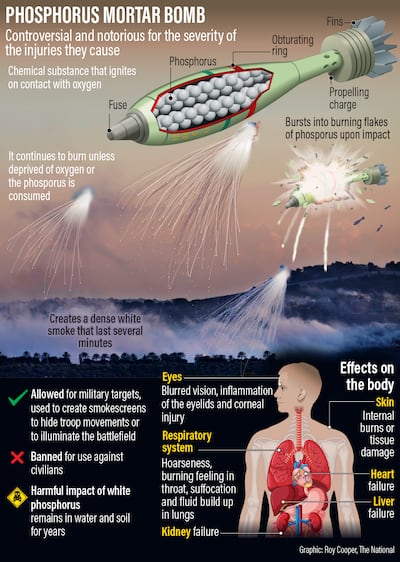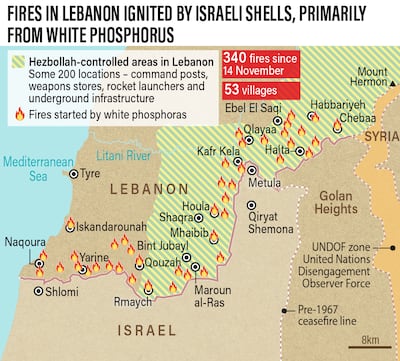Live updates: Follow the latest news on Israel-Gaza
Lebanon is training medical staff at its hospitals to deal with cases linked to the use of white phosphorus as fighting between Iran-backed Hezbollah and Israel intensifies.
The country's Ministry of Health said it had identified 67 exposures so far, but more are expected.
“We have conducted training sessions for all institutions across Lebanon – around 150 hospitals, with a focus on recognising symptoms, managing cases and using personal protective equipment,” Atika Berry, head of the ministry's preventive medicine department, told The National.
Rights groups and Lebanese officials have accused Israel of using white phosphorus – a highly toxic substance that can cause fires and inflicts terrible injuries – against civilians.

It can cause respiratory damage and organ failure when inhaled, as well as extreme burns when it makes contact with the skin.
In Lebanon, all reported cases are related to respiratory problems that required the patients to receive oxygen. Some of those affected were kept in hospital for several days.
While white phosphorus can be used legally on military targets, its use against civilians is banned under the Convention on Conventional Weapons, of which Israel is not a signatory.
Armed groups led by Hezbollah, an ally of Hamas, have exchanged cross-border fire with Israeli forces after the attack by the Palestinian militant group on Israel on October 7 and Israel's retaliatory strikes on Gaza.
Medical teams have also been trained to deal with the effects of "weapons of mass destruction", including mustard gas and nerve agents, Ms Berry said.
“This will be much worse than white phosphorus,” she said, adding that no scenario is ruled out in the conflict.

Despite the Ministry of Health's efforts, resources remain scarce in Lebanon.
The country's deep economic crisis, now in its fifth year, which began after decades of corruption and the squandering of public funds, has left the country's infrastructure reeling.
The crisis has had a major effect on the health sector, Ms Berry said.
Ali Alnaim, director of administration at the Tyre Governmental Hospital in south Lebanon, which has been spared the violence, said the hospital received seven cases of respiratory issues related to white phosphorus exposure since the onset of the border clashes.
“It's unprecedented in our careers and it's a frightening experience for the medical professionals and the patients,” he said.
All staff at the hospital have undergone training on white phosphorus injuries.
“We have enough resources to function correctly for the next 20 days at this pace – but that won’t be the case if more cases accumulate,” he said. “For now, the situation is under control."
He said the ministry was covering the cost of conflict-related treatment.
The ministry said it recorded 77 deaths and 332 injuries as of November 17 as a result of Israeli strikes – a number that the healthcare system can still easily accommodate.
A quarter of the cases related to chemical exposure.
'I couldn't breathe'
Amnesty International has called for an investigation into Israeli use of white phosphorus, saying its indiscriminate attacking of civilians could be a “war crime”.
Mr Abou Alaa, 78, a farmer from the village of Dhayra, 1km from the Israel border, is one of the victims.
His house and surrounding areas were struck by white phosphorus shells, releasing a dense smoke that trapped him inside.
“The situation was as bad outside, you could not see even a metre ahead, so I stayed in my house,” he said.
“I could not breathe, my eyes and skin were dry, my head was spinning. I was barely conscious."
He was taken to the Italian hospital in Tyre, where he stayed for four days until he recovered.
Now staying with friends in Beirut, Mr Abou Alaa lost his olive groves, livestock, herds and chickens in the shelling.
“There's nothing to be done with the situation, just to wait,” he said.
The chemical has been responsible for 340 fires, burning about 462 hectares of land and destroying 47,000 olive trees, the Lebanese Ministry of Agriculture has said.
Lebanese officials have accused Israel of conducting a scorched-earth policy in southern Lebanon, by using white phosphorus on the land to deliberately cause fires.

Long-term effects
Patients including Mr Abou Alaa have described difficulty breathing, a symptom also known as dyspnea.
“It's one of the scariest symptoms because the patient cannot breathe while being aware of what is happening to him,” said Dr Ibrahim Nasir, a pulmonologist and intensive care doctor at Aladdin Hospitals, who has encountered several instances of white phosphorus exposure since the beginning of the conflict – a first in his career.
He told The National that “the impact of white phosphorus exposure varies depending on the site of contact with the chemical”, as well as pre-existing conditions, such as asthma.
He said the inflammation of lung tissue caused by chemicals could sometimes lead to long-lasting complications.

Ali Abou Samra, 47, left his village of Zahayra, close to Dhayra, after it was bombed with white phosphorus. He said he felt uncomfortable for days after the exposure.
He said he was one of 50 people who left the village after the bombardment.
“It lasted for hours. We couldn't see anything in front of us; it took a very long time to cover the 300 metres to the main road,” he said.
“When we reached Tyre, I fell on the floor, and [I was put] under oxygen for a couple of hours. We couldn't go further. We were all very weak.”
At least 46,000 Lebanese have been displaced because of the violence.
The Israeli army admitted to firing shells containing white phosphorus, but denied using them against civilians or for starting fires, calling the claims baseless in a written statement sent to The National.

